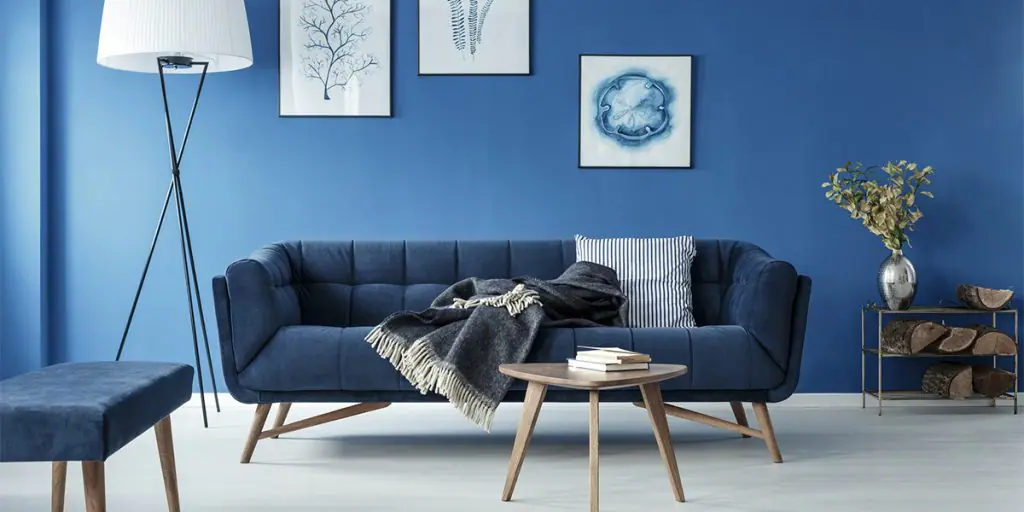
As the scorching heat of summer arrives, maintaining a cool and comfortable home becomes a top priority. Living and sleeping in an overly hot home is uncomfortable and distracting. The rising temperatures can be challenging, but you can create a cooler home with the right strategies. From optimizing your air conditioning system to incorporating energy-efficient practices, you can take steps to maintain a cool space even during a heatwave.
If you’re wondering how to keep your home cool during the summer, we have several tips to help you stay comfortable. Use these strategies to beat the heat and save money on your electric bill.
Figuring outhow to keep your home cool in the heat starts with your air conditioning. Your AC system plays a crucial role in house cooling — investing in efficient, effective cooling systems will help improve your comfort. Use a smart thermostat to regulate your home’s temperature.
With remote controls and scheduled settings, you can set your system higher when you aren’t home and lower when you need to stay cooler. Being able to schedule your thermostat and adjust it from anywhere reduces the system’s energy consumption. Instead of your AC running at full blast all day when you aren’t home, you can set it higher so less cooling takes place and less energy is used. Working your thermostat hard all the time will lead to wear and tear — give the system a break when you’re away so it can cool you when needed.
The convenience of a programmable smart thermostat allows you to have complete control over the system with little effort. Instead of forgetting to adjust your AC one day and letting it needlessly cool the home when you’re gone, you can program it from your phone and get on with your day. Smart cooling will adjust to your schedule so you reduce energy consumption while staying cool. Additionally, you can set your system to begin cooling your home while you’re on the way back, ensuring your home is at a comfortable temperature when you walk through the door.
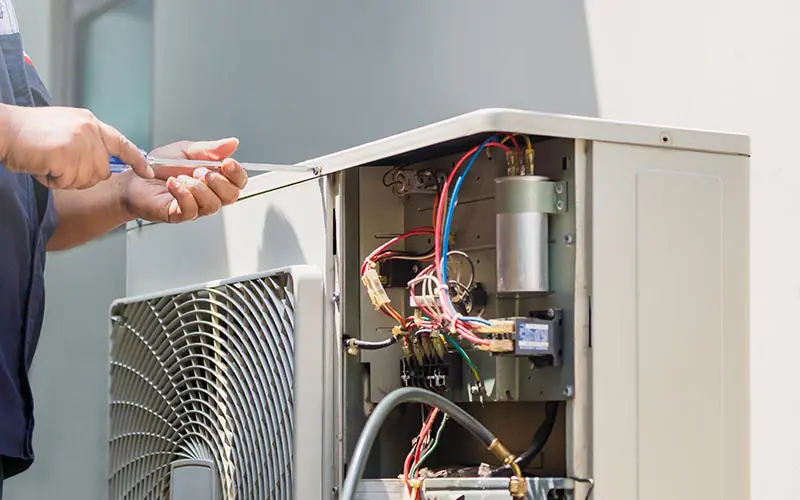
You need to perform and schedule regular air conditioning maintenance if you want your system to work at maximum cooling capacity. If your system is dirty or inefficient, it won’t cool your house properly. Taking the time to check up on your air conditioning saves you money long-term, prevents breakdowns and helps your home stay cooler more easily.
You should change your air filters at least every three months to ensure they work efficiently. The dirtier your air filter is, the less dirt it traps and the more clogged your system gets. As your air conditioning gets coated in dust and debris, it works less efficiently and more low-quality air is sent through your home. Impacted efficiency also means your system has to work much harder than normal, which can lead to a nonfunctioning air conditioner. Clean filters trap dirt and keep air moving smoothly throughout your home for improved cooling.
You’ll also want to clear debris from your exterior unit if you have one. Animal nests, leaves, dirt and debris can all build up around the outside unit — this buildup impacts its heat-dispersion efficiency and can lead to damage. Cleaning and clearing your outdoor unit will protect your air conditioner from damage and keep its cooling as efficient as possible.
Finally, you need to schedule professional air conditioning maintenance once a year. Technicians will evaluate your system and perform the necessary tuneups to keep your air conditioning smoothly. They’ll check airflow, ducts, refrigerant and more for signs of wear and damage. You’ll get a full breakdown of what needs doing to keep your AC working, and they’ll help your AC stay efficient for the best-possible cooling. Additionally, annual maintenance will help you catch issues early before they become expensive repairs or replacements.
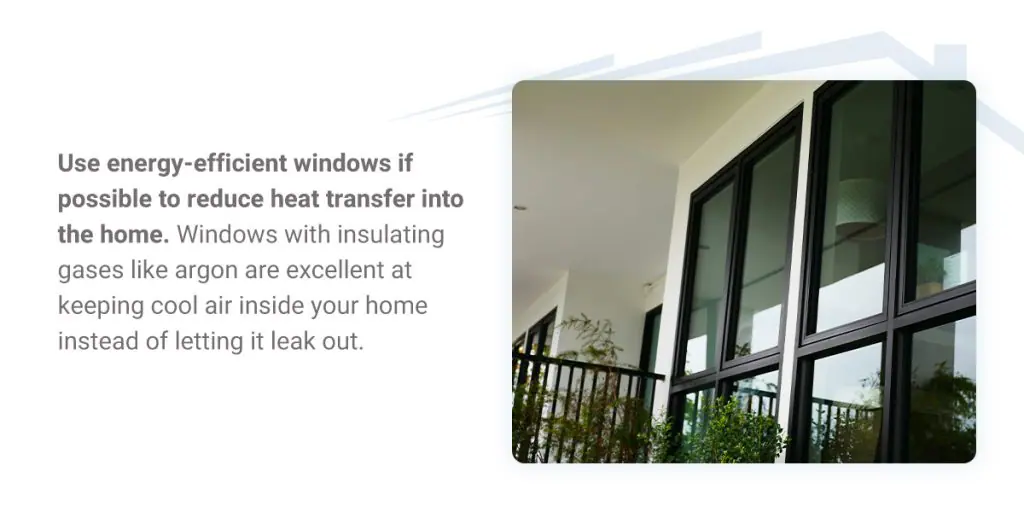
Another way to keep your home cool during a heatwave is window treatments. Use energy-efficient windows if possible to reduce heat transfer into the home. Windows with insulating gases like argon are excellent at keeping cool air inside your home instead of letting it leak out. If you cannot replace your windows, inspect them closely for cracks, gaps and damaged sealant. Air will sneak out of the spaces, preventing your home from staying cool and making your air conditioning work even harder to try and maintain a comfortable temperature.
Blinds, curtains or shades are also great for keeping your home cool. While you might want to let natural light in, the sun’s rays will warm the inside of your home up throughout the day. Light-colored window covers block and reflects the sun, preventing it from penetrating and heating your home. Keep these coverings closed during the day to maximize your sun protection and maintain home temperatures.
If things are getting too hot, you can open a non-sun-facing window and hang a wet sheet in front of it. The breeze will blow through the damp sheet, creating a cooler gust of wind throughout your home. Use this method as a last resort — if your air conditioner is on, having an open window just lets the cold air out into the heat.
Portable and ceiling fans are helpful tools for keeping your home cool in hot weather. Fans enhance circulation and create gentle breezes indoors. You should set your ceiling fans to rotate counterclockwise in the summer to push the cool air down onto room occupants. Fans do not lower room temperatures but help keep you cool by creating a wind-chill effect. Using fans alongside your air conditioning can help you feel comfortable. Additionally, the wind chill from fans may allow you to set your AC a bit higher without sacrificing comfort — you’ll use less energy while still feeling cool.
Remember to turn fans off when not in the room. Fans are great at cooling people, but their breezes are wasted on empty rooms since they don’t actually lower temperatures. Shut fans off when you move to a different area so they aren’t using electricity — this may slightly help reduce the house temperature since you aren’t spending electricity on fan operation all the time.
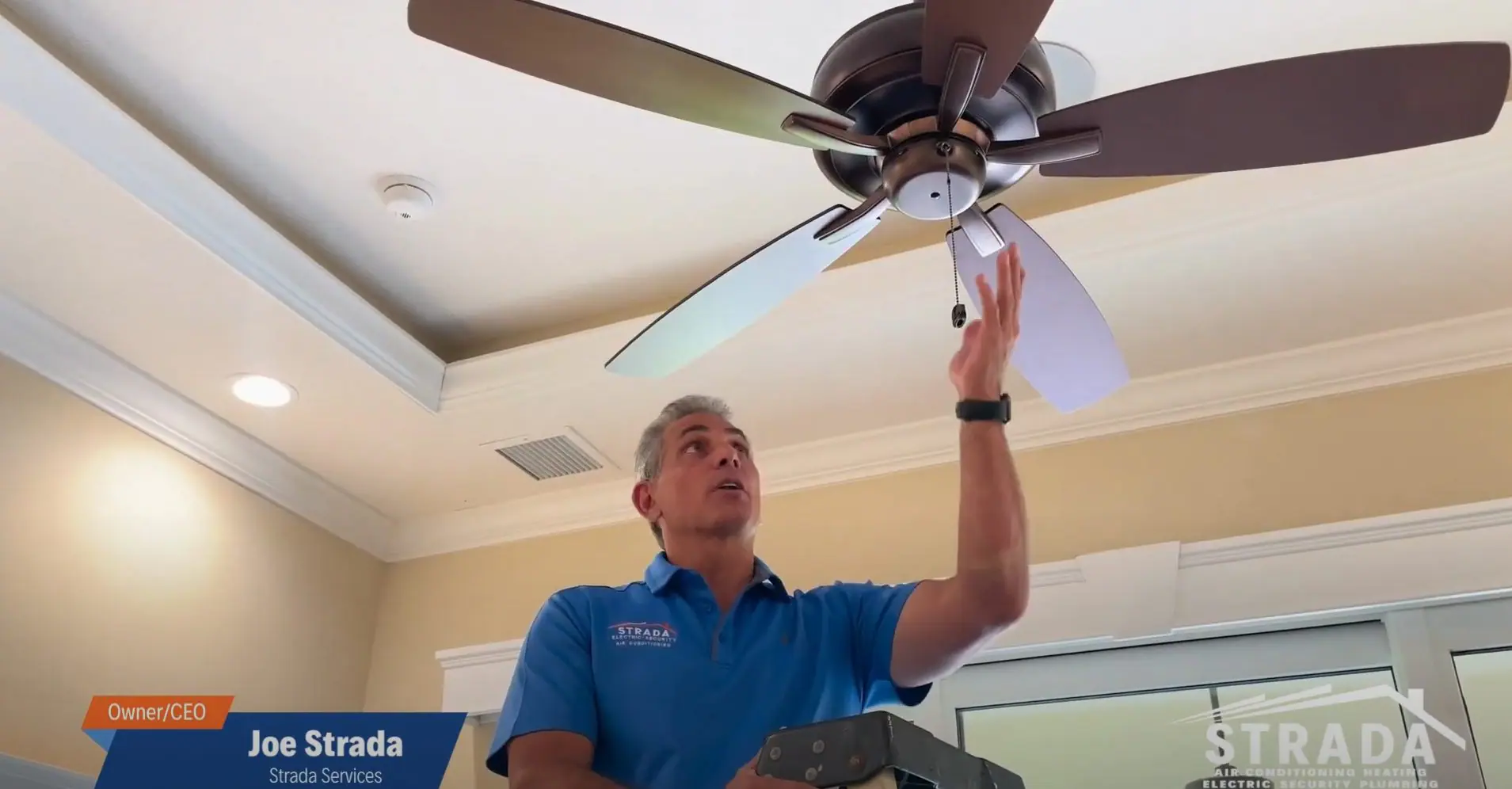
If you’re looking for ways to make your home cooler, insulation is another great place to check. Ensuring your home is well-sealed and well-insulated is essential for maintaining a cool indoor environment. Check windows, doors, garages and walls for gaps and cracks. Use caulk and weather stripping to seal any air leaks you find. You’ll prevent cool air from escaping and warm air from entering.
Check your attic insulation — you might need to update or add insulation to keep your house cool. Quality insulation helps your home remain cool in the summer and warm in the winter. With a solid layer of insulation, the air is less able to travel in and out. The better your home insulation, the more comfortable the interior will stay, even during extreme temperatures.
Electronic devices and home appliances can contribute to indoor heat. One of the best strategies for keeping your home cool in extreme heat is avoiding using heat-generating equipment inside. As appliances consume power to work, they give off heat. This heat sits inside your home, warming it up and making your air conditioning work harder to keep everything cool. If you want to stay as cool as possible, consider these practices for minimizing heat generation:
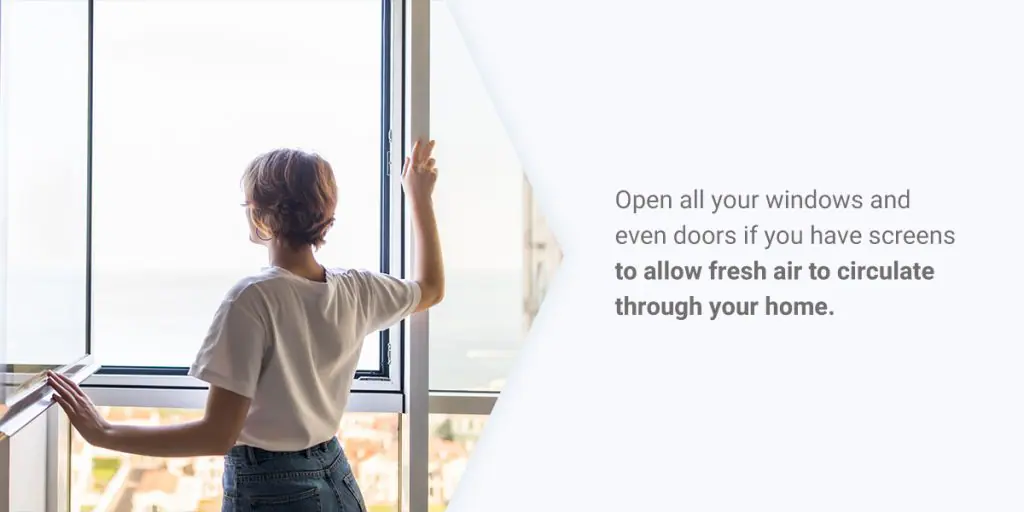
While you should keep your windows shut during the day, open them up at night to let the night breeze cool your home down. Open all your windows and even doors if you have screens to allow fresh air to circulate through your home. Ensure cross ventilation by opening windows on opposite sides of the house to create a cooling breeze. Keeping cooler air circulating throughout the night lowers your home’s temperature — when the day beings, close the windows and blinds to keep that cool air inside during the day.
High humidity levels make your home feel stuffy and too warm. Part of keeping your home cool in the summer is lowering humidity. Investing in a dehumidifier or an air conditioning system that dehumidifies makes your home more comfortable. When the humidity is too high, your body can’t properly regulate its temperature. As your body heats up, you sweat, and the sweat evaporates to cool you off. High humidity levels mean the air has lots of water in it — too much water prevents your sweat from evaporating properly.
With a dehumidifier, you’ll reduce humidity, cooling your home and helping your body regulate heat better.
If you want to know how to keep your home cool naturally, turn to your yard for help. While this is a more labor-intensive, slow-going solution, planting trees and vegetation for shade can help cool your home. Trees and foliage act as natural shades, shielding your home from the sun and improving the landscape. Once your plants reach adulthood, you’ll have an attractive, natural shade always available to you. It will take some time for your plants to achieve an adequate height for shade, but the payoff is worth it for a naturally cooler home.
Shut off vents and close doors in unused rooms during the day. If you work from home and want to keep your home office cool, restricting AC to main rooms helps reduce waste and cool air loss. Shutting off the vents and closing doors keeps cool air from flowing into unwanted spaces, redirecting it back into the rooms where it’s needed. Whether you’re working from home or want to keep the main house as cool as possible, sending AC where it’s needed keeps it from spreading out and dissipating without cooling you off.
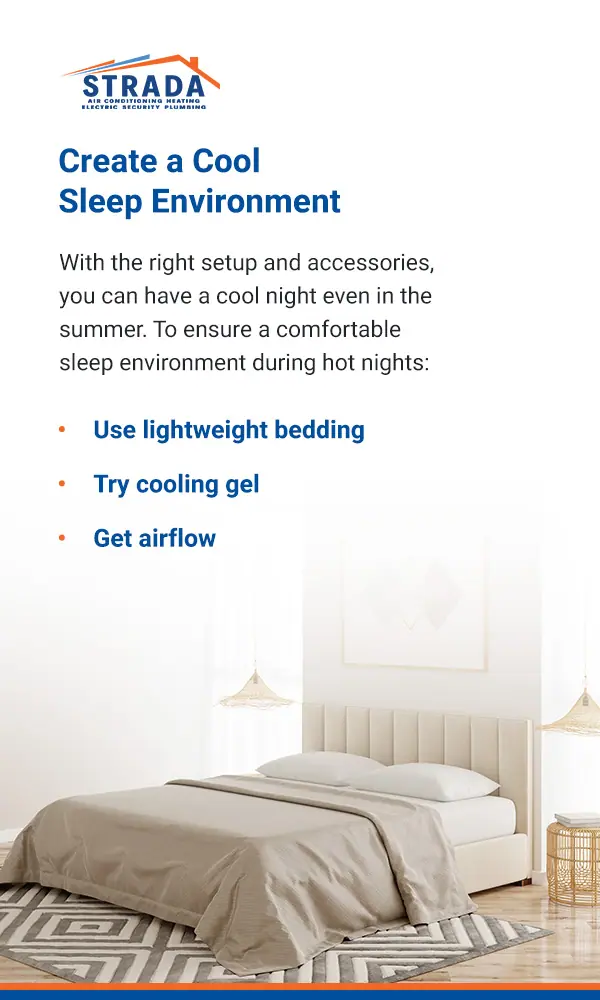
Getting a good night’s sleep is essential for your well-being. Hot nights can impede your sleep quality, making your days difficult and stressful. Trying to sleep in a hot, stuffy home is the last thing you want to deal with after a hot day. With the right setup and accessories, you can have a cool night even in the summer. To ensure a comfortable sleep environment during hot nights:
Maintaining your air conditioning system is essential if you want to stay cool and comfortable during summer. If you’re looking to maximize your AC cooling and efficiency, turn to the experts at Strada Air Conditioning & Heating for assistance. From professional air conditioning maintenance to complete system replacements, we’ve got you covered. We’ll service your air filters or check your indoor air quality, making sure you have the clean, comfortable air you need.
If you need quality air conditioning services for your ductless systems and central air conditioning units, contact us online today! We’re available to call, email or set up an online appointment so you can get the air conditioning assistance you deserve.
